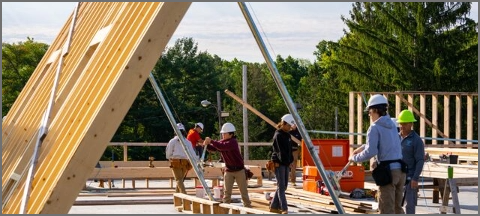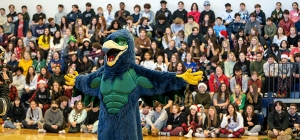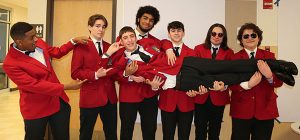Purpose Statement:
The purpose of this procedure is to share guidelines for Essex North Shore Agricultural & Technical School District (ENSATSD) students and all staff members to use social media responsibly to communicate, educate, and share in a safe and positive manner. Members of the ENSATSD community are encouraged to use social media as a way to connect with others, create and curate educational content, enhance the educational experience, and share our mission, vision, and values. While social media is engaging and valuable, there are some risks that should be considered when using these tools. In the social media world, the lines can sometimes be blurred between what is public or private, personal or professional. These guidelines will support our school community in making decisions about social media use.
Definitions
Social media platforms are websites and applications that enable users to create and share content and to participate in interactive communication/social networking. Examples include Twitter, Instagram, YouTube, Facebook, Snapchat, TikTok, Pinterest, LinkedIn, internet forums, blogs, and other messaging, video, and photo capturing applications.
A professional social media account is a work-related social media account designed to further the school district’s mission by communicating with members of the school community and the general public. Accounts may include a CTE program, teacher, classroom, athletic, club, group, activity, and other co-curricular activities.
A personal social media account is a non-work-related social media account. These accounts are set up with personal email accounts and are used for non-school-related social media activity.
These accounts are not affiliated with ENSATSD. A personal social media account is not regularly used to promote or communicate about school district events, activities, or the activities of students.
A third-party social media account is a social media account that is operated by a volunteer, parent/guardian, alumnus, or another member of the public on behalf of another legal entity or group affiliated with the school district. Third-party social media accounts are not operated by ENSATSD.
ENSATS Employee Social Media Expectations
Professional Social Media Account Establishment & Maintenance
- ENSATSD employees must request to create a professional social media account through their supervisor.
- The Superintendent-Director or their designee is required to approve the creation of all professional social media accounts prior to their creation.
- Accounts created without approval are subject to deletion.
- The ENSATSD Technology Department will maintain a list of all approved social media accounts and credentials to access them.
- Professional social media accounts must use an ENSATSD email address to access those accounts. ENSATSD email accounts may not be used to set up personal social media accounts. Any social media account that is set up with an ENSATSD email account is considered legally to be an ENSATSD account and not a personal account.
- Professional social media accounts are subject to Massachusetts public records retention laws, rules, regulations, and policies.
Content Guidelines:
- It is expected that any members of the ENSATSD community that have a professional social media account, use it in a way that is consistent with our educational mission, core values, and policies. If found in violation of these guidelines or policies, ENSATSD administrators may restrict, suspend, or terminate access to ENSATSD social media channels. procedures violations may also be subject to additional disciplinary action.
- Staff professional social media accounts will respect and protect their audience, the public, and ENSATSD’s staff, students, and community. We reflect a diverse set of customs, values, and points of view. Social media users should respect privacy rights and avoid topics considered objectionable or inflammatory topics.
- Users should also follow all federal, state, and local laws as well as district policies and guidelines, including but not limited to the Children’s Internet Protection Act (CIPA), Children’s Online Privacy Protection Act (COPPA), and Family Educational Rights and Privacy Act (FERPA).
General Guidelines:
- ENSATSD reserve the right to monitor professional social media accounts. These accounts are considered extensions of the classroom and/or professional workplace, are linked through an ENSATSD email address, and are considered ENSATSD social media accounts.
- Staff who work with students must only communicate with students through school-approved websites or professional social media sites that are designed to address reasonable instructional, educational, or extracurricular program matters.
- Staff should use sound judgment when making decisions about connecting with parents or other family members of students.
- Staff must ensure that the district has permission to publish images of students prior to posting images of students on any professional social media accounts.
- Staff should not post personally identifiable student information on social media without written permission from the parent/guardian.
- Staff should be mindful of representing ENSATSD online and generally should refrain from posting/participating in third-party social media groups regarding school-related topics or issues.
- Professional social media posts are considered legal documents. Employees using professional social media should have no expectation of privacy with regard to their use of such media. ENSATSD reserves the right to review content and restrict or remove any content and comments on professional social media accounts.
Staff Personal Social Media Use
- ENSATSD employees should not communicate or connect with students who are currently enrolled in ENSATSD using personal social media accounts.
- Staff should not allow current ENSATSD students to follow their personal social media accounts.
- Staff should be mindful of online connections to parents.
- Staff will refrain from using personal social media accounts to contact families regarding students or school-based information.
- ENSATSD employees should exercise caution, common sense, and good judgment when using personal media sites.
- As a recommended practice, ENSATSD employees are encouraged to use appropriate privacy settings to control access to their personal social media accounts.
- The posting or disclosure of student information or student work via a personal social media account, in violation of applicable laws and policy, is prohibited.
- The posting of images of currently-enrolled ENSATSD students on personal social media accounts is prohibited without written permission from the student’s parent/guardian.
- Personal social media accounts shall not use ENSATSD’s logo or visual identity elements unless given express written permission by the Superintendent-Director or their designee.
- Personal social media accounts shall not make representations that a social media account speaks in an official ENSATSD capacity.
Third-Party Social Media Account Guidelines
- Third-party social media accounts shall not use ENSATSD’s logo or visual identity elements unless given express written permission by the Superintendent-Director or their designee.
- Third-party social media accounts shall not make representations that a social media account speaks in an official ENSATSD capacity.
- Third-party social media accounts shall not post photos of ENSATSD students without written consent from ENSATSD or the student’s parent/guardian.
- Third-party social media accounts shall not disclose student information or student work without written consent from ENSATSD or the student’s parent/guardian.
Social Media Guidelines for Students:
District electronic devices are provided to students for educational purposes. Approved social media is to be used for educational purposes only under the direction of a teacher or school leader. The Children’s Online Privacy Protection Rule (“COPPA”) states that it is illegal for companies to collect user information and track the online usage of children under 13.
Therefore, students age 12 and under should only use social media designed for that age group that meets COPPA standards.
All existing policies and behavior guidelines that cover student conduct on school premises and at school-related activities similarly apply to the online environment as well:
- Students need to be aware that any information shared privately through social media on electronic devices can still be viewed, accessed, and distributed by others, including their peers. Students also need to know that all district devices use the ENSATSD network whether on campus or off campus. When using the district network and electronic devices, students should know that the district is able to access, view, record, check, receive, monitor, track, and log any social media activity.
- Students shall engage in privacy practices and respect the privacy of others.
- Students need to exercise good judgment when using the built-in camera and recording capabilities of electronic devices.
- Students need to know that they cannot share confidential information about themselves or others. Sharing personal information about oneself, family, peers or others can lead to safety and privacy concerns. Personal information includes but is not limited to name, address, phone number, school, and/or birthday.
- Students must represent themselves honestly and ethically online and are not to mislead others by impersonating another student, staff, or any other person.
- Students should know that all district employees are mandated reporters of suspected child abuse. Should information posted on social media suggest that a minor is being abused or in danger to themselves or others, district employees are required to report this information to the appropriate authorities.
- Students must restrict their access to age-appropriate, educational content when using district electronic devices or network resources. Accessing, producing, or posting inappropriate material may lead to disciplinary action.
- Students must always behave lawfully and refrain from encouraging others to act unlawfully. All School Handbook rules apply to online behavior.
- Students must take responsibility for helping to create a safe school environment on and off line by reporting bullying and hazing to a trusted district teacher or administrator. This includes cyberbullying, which is bullying through digital media such as via text, image, video, message, website post, social media activity, or any other form of communication sent by an electronic device.
- Students must produce original work and not represent the work of others as their own. Students must use materials covered by a copyright only with permission. File sharing software and websites that encourage the illegal downloading of media are forbidden.
- Students shall not create social media accounts on behalf of ENSATSD including, but not limited to, CTE programs, teachers, classrooms, athletics, clubs, groups, activities, or other co-curricular activities.
- Students’ social media accounts shall not use ENSATSD’s logo or visual identity elements unless given express written permission by the Superintendent-Director or their designee.
- Students’ social media accounts shall not make representations that a social media account speaks in an official ENSATSD capacity.
Acknowledgments: This document is partially adapted from Duxbury Public Schools Policy IJNDD.





